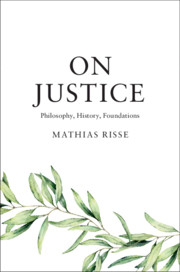Book contents
- On Justice
- On Justice
- Copyright page
- Contents
- Acknowledgments
- Introduction
- 1 Apologia for Justice
- Part I Political Philosophy
- Part II Distributive Justice
- 7 Distributive Justice and the Great Tale of Humanity
- 8 Origins
- 9 Antiquity and Beyond
- 10 Approaching the Present
- 11 Global Justice
- 12 Pluralist Internationalism
- Part III The Grounds of Justice
- Bibliography
- Index
9 - Antiquity and Beyond
from Part II - Distributive Justice
Published online by Cambridge University Press: 18 September 2020
- On Justice
- On Justice
- Copyright page
- Contents
- Acknowledgments
- Introduction
- 1 Apologia for Justice
- Part I Political Philosophy
- Part II Distributive Justice
- 7 Distributive Justice and the Great Tale of Humanity
- 8 Origins
- 9 Antiquity and Beyond
- 10 Approaching the Present
- 11 Global Justice
- 12 Pluralist Internationalism
- Part III The Grounds of Justice
- Bibliography
- Index
Summary
Christianity saw the world as a kosmos created by God. In Augustine’s appropriation, the polis became the worldly political domain. The kosmopolis became a spiritual sphere where people may become “fellow-citizens with the saints.” Once such an otherworldly dimension is added, the quest for one’s proper share of human accomplishments assumes new complexities. This chapter also talks about Ancient China, a location where thinking about justice did not start in city structures. The Chinese intellectual context was from the beginning imperial and potentially global. Moving back to the Western context, material well-being, and so a concern with poverty, is essential to the contemporary conception of social justice. That concern was absent among Plato, Aristotle, and Cicero. Another point of orientation, however, does offer this perspective: the principle, or right, of necessity. Gradually, reflection on the global becomes more vivid in Europe, and increasingly also ideas about equality become operative.
- Type
- Chapter
- Information
- On JusticePhilosophy, History, Foundations, pp. 171 - 192Publisher: Cambridge University PressPrint publication year: 2020

